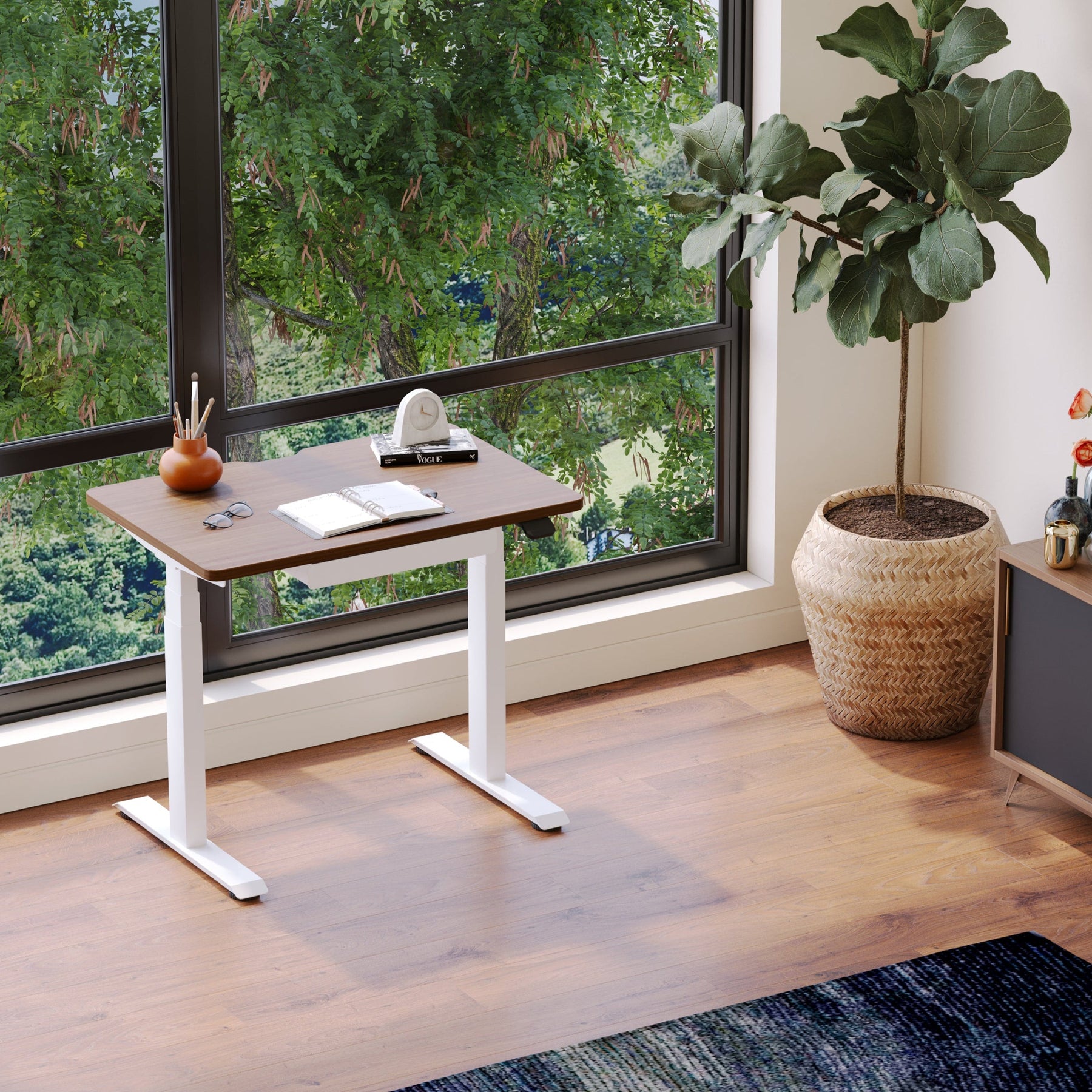Get 10% off your first order
Find the office furniture that’s designed to match your style, comfort, and needs perfectly. Subscribe
Standard Chair Height for Desk Setup Made Simple

Visit quiz page to see how we makes it easy to create an inspiring workplace

For decades, the typical office setup has involved long hours of sitting. Yet mounting research shows the toll this sedentary lifestyle takes on posture, health, and focus. Enter the standing desk a workplace innovation promising to fix slouching backs and sluggish afternoons. But are the claims real, or are standing desks just another wellness fad?
This article explores the proven standing desk benefits, clears up misconceptions, and shows how to maximize results. By the end, you’ll understand not just whether standing desks improve posture and productivity, but also how to use them strategically for long-term health and performance.
The demand for ergonomic solutions is skyrocketing. Professionals today aren’t just looking for stylish furniture; they want desks that actively support health and productivity. That’s why Urbanica’s desk collection emphasizes ergonomics alongside design.
Studies link long hours of sitting to obesity, diabetes, back pain, and cardiovascular disease. Health experts now emphasize movement as much as nutrition or exercise.
Interestingly, history shows that scholars, clerks, and even Winston Churchill preferred working while standing. Modern adjustable desks simply revive an old idea with new technology.

One of the most immediate advantages of standing desks is improved spinal alignment. Sitting compresses the spine and weakens muscles over time, while standing encourages a more neutral posture.
Standing naturally activates stabilizing muscles and prevents the “chair slump” common in office jobs.
Of course, poor standing habits — such as leaning on one leg or hunching shoulders — can undo these benefits. A proper ergonomic setup remains critical.
Beyond physical health, many users report feeling sharper and more engaged when alternating between sitting and standing. Improved blood flow delivers more oxygen to the brain, helping sustain energy through the afternoon slump.
A Harvard Health article reinforces that while standing desks aren’t miracle solutions, their role in boosting alertness and reducing fatigue is well supported.
Weight management: Standing burns slightly more calories than sitting.
Metabolic health: Frequent posture changes improve insulin sensitivity.
Cardiovascular support: Reduced sedentary time benefits heart health.
Walking meetings, treadmill desks, and sit-stand hybrid routines all complement standing desks, but the desk itself remains the most accessible solution for daily use.
When evaluating standing desk benefits, it helps to know which type suits your lifestyle.
These desks allow smooth shifts between sitting and standing. They’re ideal for professionals who spend full days at a desk. Explore Urbanica’s Adjustable Standing Desk for an elegant example.
For home offices or hybrid workers, compact options save space without sacrificing ergonomics. The Mini Standing Desk is a smart choice for students and remote professionals.
Smaller desks reduce clutter, improve focus, and adapt easily to changing study or work environments.
Shared workstations improve both ergonomics and collaboration. The Two-Person Standing Office Desk supports coworkers in achieving posture-friendly teamwork.
Standing fosters more natural conversations and dynamic brainstorming sessions.
While promising, standing desks are not magic fixes. Separating hype from fact is essential.
| Myth | Reality |
|---|---|
| Standing all day is best | Alternating between sitting, standing, and moving is healthiest |
| Standing desks fix posture automatically | Proper ergonomics and active habits are required |
| Productivity jumps instantly | Benefits develop with consistent use |
| Standing eliminates back pain | It reduces strain but doesn’t cure existing conditions |

Owning a standing desk is only the first step — how you use it determines results.
Desk height should align with elbows at 90°
Monitor should sit at or slightly below eye level
Wrists should remain neutral to avoid strain
Anti-fatigue mats, monitor risers, and supportive footwear extend comfort and prevent fatigue.
Experts recommend alternating positions every 30–60 minutes.
Spend 20 minutes sitting, 8 standing, and 2 moving. This rhythm prevents fatigue while maximizing the health benefits of standing desks.
Alternate sitting and standing frequently
Wear shoes with strong arch support
Relax shoulders and keep posture upright
Add light stretches to transitions
Use timers or apps to maintain balance
Research shows that posture directly influences mood. Standing upright improves breathing, which in turn boosts energy and emotional well-being.
Companies providing ergonomic solutions often see higher satisfaction and lower burnout rates.
Organizations investing in standing desks foster a culture of movement, showing employees that health is a corporate priority. This has ripple effects across retention and engagement.
Standing desks aren’t just about personal wellness — they offer measurable returns for employers.
Reduced absenteeism: Fewer musculoskeletal complaints
Increased output: Sustained energy throughout the day
Improved collaboration: More natural communication when standing
Case studies from companies adopting ergonomic furniture consistently highlight boosts in both performance and employee well-being.
Though pricier than traditional desks, standing desks often pay for themselves in improved health and productivity.
Wood, metal, and hybrid builds offer different balances of durability and style.
High-quality motors, strong warranties, and stable construction ensure desks last years.
The next generation of standing desks includes smart sensors that track posture, apps that encourage movement breaks, and integration with AI-driven wellness tools. Offices are evolving into hybrid environments that combine standing desks, treadmill stations, and collaboration zones.
As wellness continues to shape the future of work, standing desk benefits will remain central to healthier, more productive workplaces. To find the right fit for your lifestyle, explore Urbanica’s full desk collection.
Standing desks are more than a trend — they’re part of a cultural and medical shift toward active living. From better posture to improved focus and long-term health outcomes, the benefits of standing desks extend well beyond the office.
When used strategically with balance, ergonomics, and mindfulness, standing desks deliver on their promise of healthier, more productive work. The key is not just standing, but standing smart.
Standing desks help align the spine, reduce slouching, and engage core muscles. When set up correctly, they decrease pressure on the lower back and neck.
Yes. Alternating between sitting and standing improves circulation and focus, which helps sustain energy and concentration during long workdays.
Experts recommend alternating every 30–60 minutes, aiming for about two to four hours of standing spread across the workday. The 20-8-2 rule (sit 20, stand 8, move 2) is a practical guideline.
While not a cure-all, consistent use of standing desks can reduce risks associated with prolonged sitting, such as poor posture, obesity, and cardiovascular problems.
The best choice depends on your needs. Adjustable desks suit full-time professionals, compact desks are ideal for small spaces or hybrid workers, and collaborative desks support team productivity.

Standard Chair Height for Desk Setup Made Simple

Ergonomic Computer Stand Ideas for Better Alignment

Most Comfortable Inexpensive Office Chair Features
Get 10% off your first order
Find the office furniture that’s designed to match your style, comfort, and needs perfectly. Subscribe
Leave a comment